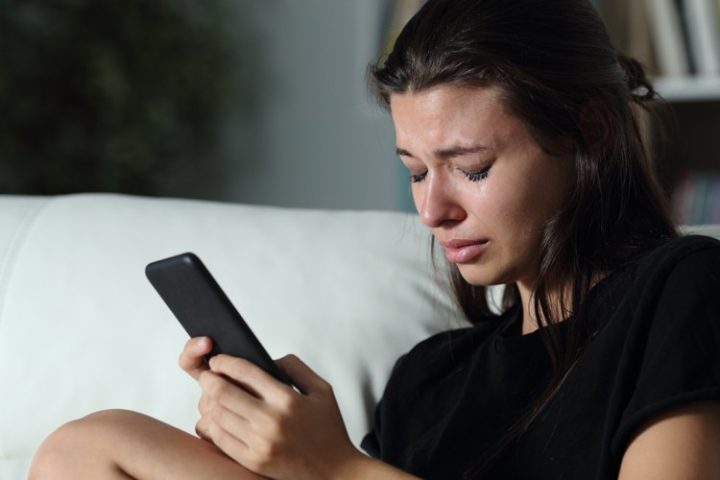
In a series of previous articles, The New American has addressed a startling program rolled out by Democrat Virginia Governor Ralph Northam. That program is a sex textline for teens. The series has addressed the textline itself, parents’ reactions, and the sexual grooming of teens that is part of the program and its advertising campaign. In this piece, we will look at the organization being paid to administer the program and the information it provides to teens.
Virginia is not the first state to implement this program and will almost certainly not be the last. The New American was able to verify that the BrdsNBz sex textline for teens is available in Florida, North Carolina, and New Mexico, as well as now in Virginia. California has its own home-grown version of the program — subtly named “Hookup.” Because the website for the service suspiciously does not list states where it is available, the program may be available in other states, as well.
If your state does not already have it, expect it at some point in the future. Or, be prepared to fight to keep it out. But that is a difficult fight. Because while the program is meeting harsh resistance in Virginia — from lawmakers, parents, and pro-family organizations — Northam’s administration is Hell-bent on keeping it in place. One Democrat state senator even actually argued that it’s safer for a teen to send text messages about sex to a complete stranger, without their parents’ knowledge, than to talk to his or her parent.
As this writer pointed out in the first article in the series:
Liberal Democrat Governor Ralph Northam has introduced an initiative to allow kids to text questions about sex — including questions about sexual activity, safe sex, contraception, abortion, sexually transmitted infections, relationships, and “gender identity” — to adults.
As that article also showed, the marketing promoting the sex textline is deeply disturbing, since it has been mailed to addresses all over Virginia. Those postcards are designed with artwork geared toward teens. It shows teens using mobile phones and taking selfies. The postcards are addressed to teens, not their parents. The intent is clear: Make an end-run around parents to reach kids with materials cleverly designed to appeal to their baser sexual inclinations and create an even greater sexualized teen culture.
The second article focuses on the reaction of parents to having this material made available to their kids — and the obvious usurpation by the State of parental authority to mold the morals of consciences of kids. That article included many quotes from concerned parents, The sum of those interviews is that it is the parent, not the State, that has the authority and the responsibility to provide an education about sex and sexuality to kids. Of course, the real rub is that the service — while promoted and paid for by the State with taxpayer dollars — is administered by a third-party organization — more about that later in this article.
The third article leans on the experience of a former Richmond, Virginia, private investigator who spent years working with victims of sex trafficking. That private investigator — Kimberly Williams — shares, from her professional experience, how this sex textline normalizes the behaviors needed by sexual predators and makes easy victims of young people.
The bottom line is that, as Kimberly told The New American, the approach and materials associated with this program are “straight out of the grooming children handbook.”
Before taking a deep dive into the organization behind this, this writer needs to reiterate an important point about the shadowy nature and surreptitious way that organization inserts itself into the sexual lives of teens. Anyone looking at the postcards mailed to teens across the state would reasonably think that the textline is an official program of the state of Virginia.
The number provided on the postcard — mailed by the Virginia Department of Health (VDH) — is 66746. When one texts “Talk2MeVa” to that number, as this writer did, the response — from 833-933-6655 — is, “Success! 1. Reply to this text w/ your question or message. 2. Save this number in ur phone as Talk2MeVa to text us later. Reply stop to quit.” Nothing so far tells the teen that he or she is texting a third party that has not yet identified itself. The teen is instead encouraged to go ahead and ask a very personal sexual question — thinking he or she is communicating with a VDH employee. Only after sending the question is the teen informed that he or she is actually texting the American sexual Health Association (ASHA). That text reads, “Thnx 4 textingBrdsNBz — part of the American Sexual Health Association (ASHA). We’ll get back 2 u ASAP. +Find info at http://iwannaknow.org/”
Not only does ASHA use subterfuge to engage teens in sexual conversations, but it immediately recommends one of its own websites as a resource while the teen waits for an answer. That website — cleverly named I Wanna Know — is a trove of “information.”
Prominent buttons on the site lead to pages featuring how to protect oneself from sexually transmitted infections (STIs), information on “comprehensive sex ed,” “oral sex and STIs,” STI testing, and more. Interestingly, above all of that — and given the most prominent spot on the page — is a link to learn how to become an “ASHA Ambassador.” The tags for that link — helping searches lead visitors there — are “ambassador,” “Sexual Health,” and “LGBTQ.” The page one is sent to by clicking the link explains the importance of ASHA ambassadors and the qualifications for becoming one. As to the importance:
Sexual health is at the center of a growing movement to make life better for people everywhere. For too long this has been a taboo topic. People were afraid to talk about sex and about sexual health. The ASHA Ambassador program is a positive way to change that.
The page goes on to explain, “ASHA ambassadors are people who are unafraid to speak sexual health.” And “Each ASHA Ambassador is part of a wider network of people, all with the goal to bring the topic of sexual health front and center.”
That sounds like a heavy responsibility, right? Wrong. The page explains the duties and qualifications:
Social media is everywhere, and it’s a powerful tool in the fight for improved sexual health. ASHA Ambassadors leverage social media and so get people talking about sexual health, to break the taboos. More openness and conversation impacts people’s lives!
What? Are they really just asking people with a social media presence to simply post about sexual health and steer people to their website? And are they really calling that being an “ambassador”?
Yep.
Because the page also says, “It starts with one post, one tweet, one pin at a time,” and suggests the hashtags #ispeaksexhealth and #ashaad. It goes on to talk about how one can become an “ASHA Ambassador,” saying, “Being an ASHA Ambassador is EASY [emphasis in original]. And explains:
As an ASHA Ambassador, you’ll educate people about sexual health with the support of the ASHA database of knowledge. There are no set requirements for you, and it’s easy to do! You can make a difference simply by tweeting, posting pics, sharing and liking posts, or even creating content for our blog.
The more you like, comment, share, and create, the more people you’ll impact. Social media works! Together we can make it work for something good. Joining the ASHA Ambassador team is simple and easy. Sign Up Today! Click here to join, and start making a difference right now!
The bar is low indeed. Simply share ASHA’s views on sex and sexuality, and post away on social media with “no set requirements.” The applicant pool must positively overflow with qualified candidates. Because anyone who applies and is accepted (which means anyone with a pulse and a liberal attitude toward sexuality) will get the following benefits: “We’ll promote you on the ASHA website”; “You’ll get the title of official ASHA Ambassador”; “Tons of incentives and discounts”; “Mentorship from ASHA’s awesome staff”; “Membership in an elite community of sexual health pioneers”; and “The feeling of taking action for change!”
These are the people who want to “educate” teens about the birds and the bees.
The main page also includes a smaller set of buttons at the top: “Sexual Health,” “STDs/STIs,” “Relationships,” “LGBTQ,” “Pregnancy and Parenthood,” and “Myths & Facts.”
It is not surprising that the link on pregnancy and parenthood paints a bleak picture of teen pregnancy and ends with a link to the Orwellian-sounding “Office of Population Affairs” to help a teen who finds herself pregnant “search for a local family planning clinic” where she can have her unborn child aborted.
The Myths and Facts page is filled with misleading information designed to make teens think sexual activity is appropriate for his or her age. For instance, under the heading “The best way to avoid getting pregnant is to use a condom,” the “answer” is:
MYTH! The best way to avoid getting pregnant is though abstinence. Abstinence (not having any kind of sex) is the only 100% effective form of birth control. If abstinence isn’t an option, using a condom in combination with a hormonal form of birth control is a close second. For example, this could be a condom used together with the birth control pill.
So, abstinence is the only way to avoid getting pregnant, but it is not promoted. Because, the writers of this page chose to add, “If abstinence isn’t an option,” as if it is not a matter of choice and will. The implication is that the sex drive of teens is an unconquerable force. Self control is so weak and inconsequential as to not be deserving of even a passing mention.
A video on the right side of the home page is labeled “#yesmeanstest.” The video features stand-up comic Whitney Cummings doing person-on-the-street interviews about testing for STDs/STIs. She parks a catering truck, sets up some tables, and offers free smoothies, because they are healthy. It is all a ruse to engage strangers in personal sexual conversations. The purpose is to promote the idea that the “responsible” thing to do is to get tested regularly — especially between partners. While the video points out that “each year, there are 3.7 million new cases of Chlamydiae and Gonorrhea,” the “solution” proposed is that everyone should get tested regularly. Again, conspicuously absent is any advice to practice abstinence (or at least avoid promiscuity) as a sure-fire way to practice “sexual health.” The under-girding and overarching assumption is that not having sex and not regularly switching partners is simply not an option.
As to the dishonest nature of the ruse, Cummings even states to the camera, “I’ve brought them some free smoothies to lure them into talking to me about ways they can take care of their health.” That transition is abrupt. One young woman sits down to enjoy her smoothie and have a conversation about health. Cummings says to her, “I feel like everyone’s really concerned about their health, from like a food and exercise perspective, but like they’re not taking care of their sexual health.” The young woman is shocked and begins to ask, “What do you mean sexual hea—” when Cummings cuts in with “You know what I’m talking about? Like getting STD tests?” Perhaps someone should tell Cummings and ASHA that “luring” in the context of a conversation about sex is creepy, at best.
But deceit, subterfuge, and “luring” are the tools ASHA gladly employs in its endeavor to sexualize more and more teens at younger and younger ages. After all, that — along with the assumption that being sexually active at a young age is perfectly fine and healthy — is one of the hallmarks of this sex textline campaign.




